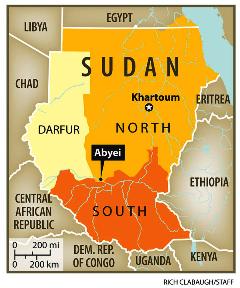S. Sudan launches Ebola sensitization and awareness campaign
May 23, 2018 (JUBA) – A high-level mission comprised of Ministry of Health (MOH) in South Sudan and the World Health Organization (WHO) visited Yambio, former Western Equatoria State on a sensitization campaign.
 The campaign comes in the wake of an Ebola outbreak declared in neighbouring Democratic Republic of Congo (DRC), which has killed dozens of people.
The campaign comes in the wake of an Ebola outbreak declared in neighbouring Democratic Republic of Congo (DRC), which has killed dozens of people.
Speaking at the launch of the campaign, South Sudan’s health minister, Riek Gai Kok briefed the state governor, cabinets, members of the parliament, United Nations agencies, non-governmental organizations, community based organizations and the general public on the basics of the disease, how it is transmitted and the preventive measures that can be taken to sensitizing the community.
“The Ministry of Health is increasingly concerned about the situation in DRC and is working in Gbudue, Tambura, Maridi and Yei River states alongside their respective state health ministries, both to train medical staff on preventive measures and supply medical equipment for hospitals”, said the minister.
He added, “Key to our response is training community health workers to recognize the symptoms of the virus and refer potential cases for immediate medical care”.
Ebola is a viral hemorrhagic fever of humans and other primates caused by Ebola viruses. Signs and symptoms typically start between two days and three weeks after contracting the virus with a fever, sore throat, muscular pain, and headaches. Vomiting, diarrhea and rash usually follow along with decreased function of the liver and kidneys.
“Although no cases of EVD [Ebola Virus Disease] have been reported in South Sudan, the outbreak in DRC is of concern as it places the country at greater risk,” said Argata Guracha Guyo, the WHO emergency coordinator for South Sudan.
Officials have, however, outlined a number of measures already in place to prevent the entry and spread of the Ebola disease into South Sudan.
Already in place is a multi-sectoral Ebola Preparedness and Response Task Force to coordinate preparedness and risk monitoring activities, an Ebola contingency plan is being updated to strengthen readiness capacities and surveillance officers have been placed at points entry to enhance surveillance and early detection of cases.
(ST)
